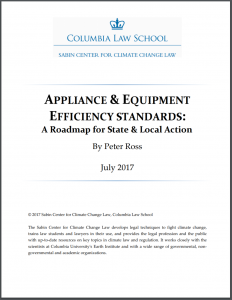Full Title: Appliance & Equipment Efficiency Standards: A Roadmap For State & Local Action
Author(s): Peter Ross
Publisher(s): Columbia Law School
Publication Date: July 1, 2017
Full Text: Download Resource
Description (excerpt):
For decades, federal energy and water efficiency standards have demonstrably saved consumers money, reduced pollution, and increased grid reliability. The U.S. Department of Energy (“DOE”) periodically reviews standards and test procedures for more than 60 products, representing about 90% of home energy use, 60% of commercial building energy use, and 30% of industrial energy use. Due in part to their incremental nature and proven track record of success, these standards have been relatively uncontroversial, and often have been reached via consensus between manufacturers seeking regulatory certainty and environmental advocates seeking greater efficiency.
Recently, however, the political winds have shifted. Immediately upon taking office, the Trump Administration refused to publish in the Federal Register several efficiency standards that DOE had promulgated in 2016, and has proposed budget cuts to the parts of DOE responsible for administering the appliance and equipment standards program. With the federal advancement of energy efficiency in doubt, leadership on this issue may fall to state and local actors.
This white paper examines how the Energy Policy and Conservation Act (“EPCA”), and the DOE regulations promulgated thereunder, prevent states and cities from outlawing the sale or use of inefficient appliances and equipment. It surveys existing state efficiency laws that cover products beyond federal jurisdiction, and discusses several steps states can take to advance appliance and equipment efficiency in the wake of Washington’s inaction.
